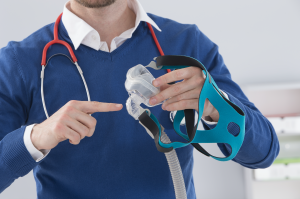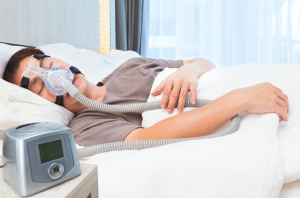 What is sleep apnea? Do you wake up in the morning after a full night’s sleep feeling as if you haven’t rested at all? Does your partner complain about your loud snoring at night? Have you ever woken up gasping for air?
What is sleep apnea? Do you wake up in the morning after a full night’s sleep feeling as if you haven’t rested at all? Does your partner complain about your loud snoring at night? Have you ever woken up gasping for air?
Any one of those situations could mean that you have sleep apnea, a condition that has potentially serious repercussions if left unchecked. With consequences that can affect everything from your oral health to your heart health, dentists are often the first medical professional to recognize the signs and symptoms. Your regular dental checkup could be an opportune time to identify the problem — and take the steps necessary to address it before it becomes dire.
What exactly is sleep apnea?
Sleep apnea is a disorder in which a person starts and stops breathing throughout a night of sleep. This fitful breathing can affect everything from fatigue to disrupting your partner’s sleep to having extremely negative impacts on your health.
There are three types:
Obstructive sleep apnea occurs when your throat muscles relax, and it is one of the most common forms of sleep apnea.
Central sleep apnea occurs when your brain doesn’t send the correct signals to the muscles that control your breathing at night.
Complex sleep apnea represents a combination of central and obstructive sleep apnea.
How do I know if I have sleep apnea?
You may have sleep apnea if you wake up in the morning and don’t feel rested — in spite of having been in bed for a normal range of time during the night. When your breathing stops and starts throughout the night, it sends signals to your body to wake up to breathe. That means that if you wake up and fall back asleep multiple times throughout the night, you are unable to obtain the deep sleep that helps you truly rest.
Your partner may also notice you snoring loudly, or gasping for breath, throughout the night. Heavy snoring can be a sign of it.
There are additional indicators you may look for. Men — and older individuals – are more likely to have both obstructive and central sleep apnea. If your parents or grandparents had it, you are also more likely to develop the condition. Smokers and people who drink are also more likely to experience obstructive sleep apnea — as are overweight individuals.
A regular checkup at the dentist may also be the first time you realize you might have an issue. Dentists can see the earliest warning sign of the condition: teeth grinding, or bruxism. Your dentist can help refer you to a doctor, who will handle the formal diagnosis. You may undergo a sleep study or further testing to determine the extent of the condition.
How does sleep apnea affect my health?
It can affect your health in many different ways. Experiencing fatigue during the day is common, as it limits your ability to rest well throughout the night. Being tired when you should normally have good energy could have a ripple effect on your quality of life, putting you at risk for operating vehicles or attending your job while drowsy. Experiencing sleepiness can also increase your irritability and moodiness.
It may surprise you to discover that sleep apnea can also affect your oral health. Nighttime teeth grinding is one of the earliest indications that you may have an issue. Grinding can wear down the surfaces of your teeth, making them more susceptible to decay and cavities — not to mention breakage. Teeth grinding can also put your gum health at risk, causing inflammation and receding gums.
Sleep apnea can cause many more serious health concerns, including increasing the risk of Type 2 diabetes, metabolic syndrome, high blood pressure, heart health issues, liver abnormalities, complications with medications, and issues with surgery.
One issue that may not be emphasized enough is the effect on your partner’s ability to experience rest at night. Your disruptive snoring, gasping, and breathing issues throughout sleep can deprive your partner of their sleep. This may even drive your partner to seek alternate sleeping arrangements.
In the end, it is well worth it to address your sleeping concerns — for both your health and your loved one’s sake.
What are my options for treating it?
 Thankfully, there are a number of options for treating sleep apnea. You don’t have to suffer!
Thankfully, there are a number of options for treating sleep apnea. You don’t have to suffer!
For cases that aren’t as serious as others, your doctor may recommend that you make lifestyle changes, like quitting smoking or losing weight.
Otherwise, you may use other devices to help keep your airways open at night. Oral appliances bring your jaw forward, opening your throat while you are asleep. There are several different kinds of appliances that may help, and you may try several before settling on the one that works for you.
Other sufferers find relief with CPAP machines. CPAP stands for continuous positive airway pressure. You can wear a nose mask or a full face mask if you breathe through your mouth.
Overall, if you suspect you may have sleep apnea, ask us to check for signs of bruxism during your next visit — we’re happy to help!



